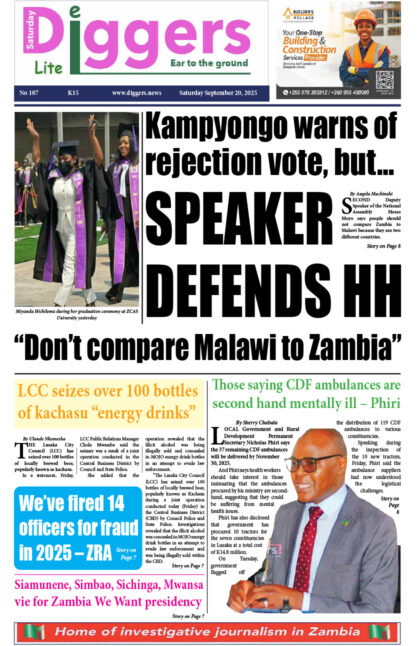The Law Association of Zambia (LAZ) has subpoenaed Minister of Justice Given Lubinda and Attorney General Likando Kalaluka to appear before Constitutional Court today to testify in the petition where it is challenging government’s attempt to alter the Constitution of Zambia through Bill 10, 2019.
According to a combined writ of subpoena to Lubinda and Kalaluka, the two are commanded in the name of the President to appear before court and give evidence on behalf of LAZ.
Meanwhile, President Edgar Lungu, Attorney General and the National Assembly have submitted to the Constitutional Court that LAZ can only challenge the contents of Bill 10 if the same are enacted into law.
They have submitted that LAZ is not entitled to any of the reliefs being sought in its petition and as such it should be dismissed with costs.
In this matter, LAZ has petitioned the Court for a declaration that the respondents’ decision to the extent to which it seeks to amend the Constitution in the manner set in the Constitution of Zambia (Amendment) Bill No. 10 of 2019 is illegal because it contravenes Articles 1 (2), 8, 9, 61, 79, 90, 91, 92 and 79 of the Constitution.
But in an answer to the petition filed in the Constitutional Court by the Attorney General’s Chambers, Wednesday, the respondents argued that LAZ could only challenge the contents of the Bill if the same were enacted into law as the court would then have the power to review the said law.
“However, in a case of a Constitutional amendment, this honorable court would have no such jurisdiction as the amended Constitution would be supreme law. The respondents aver that LAZ is not entitled to any of the reliefs sought and that the petition ought to be dismissed with costs to the respondents,” Kalaluka stated.
He stated that the Constitutional Court could not be called upon to make pronouncements and declarations on the contents of a Bill, which was proposed law.
Kalaluka further stated that the respondents shall put LAZ to strict proof on its assertion that Article 1, 2, 8, 9, 90, 91, 92 and 79 of the Constitution have been violated by the respondents without reference to provisions of the Bill, which was merely proposed law.
He stated that the respondents would aver that the constitutional mandate of the Court was to consider the constitutionality of law in the form of an Act of Parliament or Statutory Instrument and not proposed law in the from of a Bill.
“The respondents shall also aver that this honourable court has no jurisdiction to hear this matter, which is essentially a challenge of the contents of a Bill, which is proposed law,” Kalaluka stated.
“The respondents shall further aver that LAZ, which is a statutory body of lawyers, knew or ought to have known that it could not invoke this court’s jurisdiction to challenge an Act of Parliament under Article 128 (3) (a) of the Constitution because what it really sought to challenge was proposed law, and, therefore, opted to portray the constitutionally prescribed mandates of the Republican President, the Attorney General and the National Assembly in the legislative process as decisions so as to move this court under Article 128 (3) (b).”
The Attorney General, however, admitted that President Lungu as per Article 92 (2) (i) of the Constitution initiated the Constitution of Zambia (Amendment) Bill No. 10 of 2019 as mandated by law and further admitted that the Attorney General signed the Bill in accordance with Article 177 (5)(c) of the Constitution.
Meanwhile, LAZ subpoenaed Lubinda and Kalaluka to testify on their behalf today.
“You are commanded in the President’s name to attend before the Constitutional Court, Supreme Court building, Independence Avenue, Lusaka on 11th day of October, 2019, at 09:00 hours in the forenoon and so from day to day until the above cause is tried to give evidence on behalf of the petitioner (LAZ),” the writ read in part.
Lubinda is further being commanded to take to court: reports, research materials, memoranda, write-ups or data in whatever forms stored or any material whatsoever generated before Bill 10 was drafted and published in the government gazette, which showed the extent to which the Constitution as amended on January 5, 2016, satisfied or failed to meet the mandate and terms of reference of the Technical Committee appointed by president Micheal Sata on November 16, 2011.
Also, detail the challenges, problems or constraints faced by the Republic or the respondents in the governance of the Republic since the amendment of the Constitution on January 5, 2016; show how the decision to alter the Constitution as set out in the Bill will protect the Constitution and promote the democratic governance of the Republic as required by Article 61 of the Constitution; explain how the decision to alter the Constitution as set out in the Bill will promote the well-being and benefit of the people of Zambia as required in Article 90 of the Constitution.
Further, show how President Lungu’s decision to alter the Constitution in the manner set out in the Bill is consistent with his constitutional obligation under Article 91 of the Constitution to: respect, uphold and safeguard the Constitution; safeguard the sovereignty of the Republic; promote democracy and enhance national unity; promote and protect the rights and freedoms of all persons in Zambia and uphold the rule of law.
























